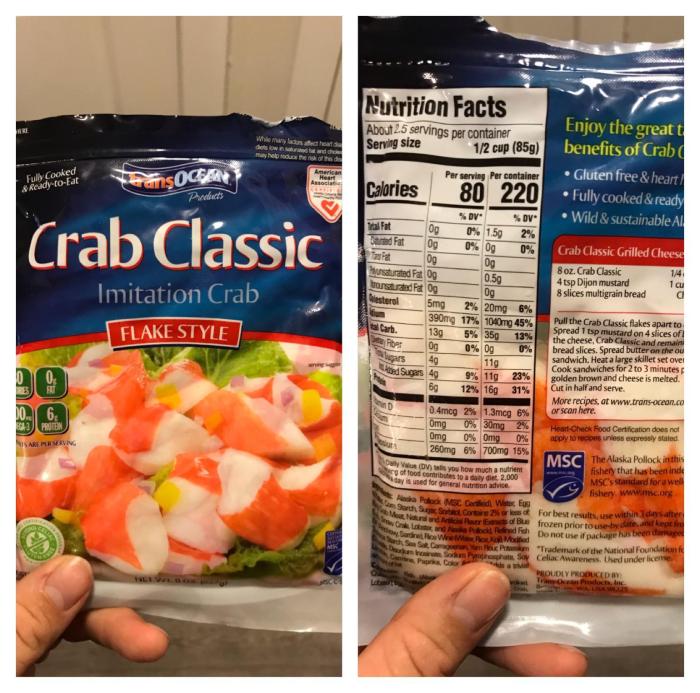Health Benefits Associated with Crab Meat Consumption: Crab Meat Nutrition Facts

Crab meat nutrition facts – Crab meat, a culinary delight enjoyed across cultures, offers a surprising array of health benefits that extend beyond its exquisite taste. This exploration delves into the nutritional bounty of crab meat, revealing its profound impact on various aspects of our well-being, reflecting a harmonious balance within the body’s intricate systems. Consider it a journey of self-discovery, where the nourishment of the body mirrors the nourishment of the soul.
Crab meat, while delicious, is surprisingly high in cholesterol. Understanding its nutritional profile is crucial for informed dietary choices. However, comparing its nutritional content to other restaurant options, such as those found on the northstar cafe nutrition facts page, provides valuable context. Ultimately, responsible crab meat consumption requires careful consideration of overall dietary balance.
Heart Health Benefits of Crab Meat
Crab meat presents a unique contribution to cardiovascular well-being. Its relatively low cholesterol content, coupled with a respectable amount of omega-3 fatty acids, positions it favorably in a heart-healthy diet. Omega-3s, essential fatty acids our bodies cannot produce, play a vital role in reducing inflammation and triglyceride levels, thereby contributing to a healthier heart. The balance between these beneficial fats and the lower cholesterol content suggests a potential role in mitigating the risk of heart disease.
For instance, a diet incorporating lean protein sources like crab meat, alongside plenty of fruits and vegetables, can significantly improve cardiovascular health profiles. This isn’t merely a matter of scientific data; it’s a testament to the interconnectedness of mindful eating and overall well-being.
Immune System Support from Crab Meat, Crab meat nutrition facts
The body’s intricate defense mechanisms, the immune system, rely on a robust supply of vitamins and minerals. Crab meat contributes significantly to this vital system. It’s a good source of selenium, a trace mineral crucial for immune function, acting as an antioxidant to protect cells from damage. Furthermore, its zinc content supports the development and activity of immune cells, enhancing the body’s natural ability to combat infection.
The synergistic action of these micronutrients, working in concert, reinforces the body’s inherent capacity to maintain health and resist disease. Imagine the immune system as a well-trained army, and these nutrients as the essential supplies that keep it strong and ready for action.
Crab Meat’s Role in Muscle Growth and Repair
Protein, the building block of life, is paramount for muscle growth and repair. Crab meat, a lean source of protein, provides the essential amino acids needed for these processes. This is particularly beneficial for athletes or individuals engaged in regular physical activity, where muscle repair is crucial for maintaining strength and performance. Consider the protein in crab meat as the scaffolding upon which strong, resilient muscles are built.
Just as a master craftsman carefully selects his materials, so too should we choose protein sources that support our bodies’ needs.
Bone Health Benefits of Crab Meat
Maintaining strong bones is a lifelong endeavor. Crab meat contributes to this crucial aspect of health through its mineral content. It is a source of zinc and selenium, both of which play a role in bone metabolism and density. These minerals work synergistically with other nutrients to support bone health, reducing the risk of osteoporosis and other bone-related conditions.
Think of the bones as the sturdy foundation of our physical structure, and the minerals in crab meat as the reinforcement that ensures longevity and strength.
Potential Health Concerns and Considerations

The path to optimal well-being, like the ebb and flow of the tide, requires mindful navigation. While crab meat offers a bounty of nutritional gifts, understanding potential challenges allows us to savor its benefits responsibly. This section illuminates potential health concerns, empowering us to make informed choices aligned with our individual needs and sensitivities.
Crab Meat Allergies and Associated Reactions
Crab meat, a delectable treasure from the sea, can unfortunately trigger allergic reactions in susceptible individuals. These reactions stem from proteins within the crab, causing a range of responses from mild discomfort to severe, life-threatening anaphylaxis. Symptoms can include hives, itching, swelling, digestive upset, and difficulty breathing. Individuals with known shellfish allergies should exercise extreme caution, and those experiencing any allergic reaction after crab consumption should seek immediate medical attention.
The severity of allergic reactions varies greatly, underscoring the importance of individual awareness and preparedness.
Mercury Contamination in Crab Meat and Safe Consumption Recommendations
The ocean, a vast and mysterious realm, can harbor both treasures and potential hazards. Mercury, a naturally occurring element, can accumulate in marine life, including crab. While crab generally contains lower levels of mercury than some larger predatory fish, consumption of contaminated crab can pose risks, particularly to pregnant women, nursing mothers, and young children. The body’s ability to process mercury is limited, and excessive exposure can harm the nervous system.
Choosing crab from reputable, sustainably sourced fisheries, and adhering to recommended consumption guidelines from health organizations, are crucial steps in minimizing this risk. A balanced approach, mindful of both the benefits and potential drawbacks, allows us to navigate this aspect of our culinary journey with wisdom.
Sodium Content in Processed Crab Meat and Healthier Preparation Methods
The culinary arts often involve transformative processes, and these can sometimes alter the nutritional profile of our food. Processed crab meat, while convenient, often contains significantly higher levels of sodium than fresh or minimally processed crab. Excessive sodium intake is linked to high blood pressure and other health problems. To reduce sodium intake, consider choosing fresh or lightly processed crab meat.
Preparing crab meat at home, using herbs, spices, and citrus instead of excessive salt, offers a pathway to savor its deliciousness while safeguarding our well-being. Mindful preparation, embracing the natural flavors of the crab, is a path to both culinary delight and healthy living.
Dietary Restrictions and Safe Crab Meat Incorporation
The journey towards balanced nutrition often requires navigating individual dietary needs. Individuals following low-sodium or low-cholesterol diets may need to adjust their crab meat consumption accordingly. For low-sodium diets, opting for fresh or minimally processed crab meat and employing mindful preparation techniques, as mentioned earlier, is paramount. For those managing cholesterol, remember that crab meat is relatively low in cholesterol compared to many other protein sources, but moderation is still key, particularly when combined with other high-cholesterol foods.
Consulting a registered dietitian or nutritionist can provide personalized guidance on safely integrating crab meat into a balanced diet tailored to specific health needs. This approach fosters a harmonious relationship between culinary enjoyment and individual health goals.
Query Resolution
Is all crab meat created equal nutritionally?
No. Nutritional content varies based on species, fishing location, and preparation methods. Wild-caught crab may differ from farmed crab in terms of nutrient density and potential contaminants.
How can I minimize mercury exposure when eating crab?
Choose crab from regions with lower mercury levels and limit consumption, especially for pregnant women and young children. Variety in seafood consumption is key.
What are the best ways to prepare crab meat to preserve its nutrients?
Steaming and baking are generally preferred methods, minimizing nutrient loss and reducing the need for added sodium or unhealthy fats.
Are there ethical concerns surrounding crab fishing?
Yes. Overfishing, bycatch (unintentional capture of other marine life), and habitat destruction are significant concerns. Look for sustainably sourced crab with relevant certifications.
